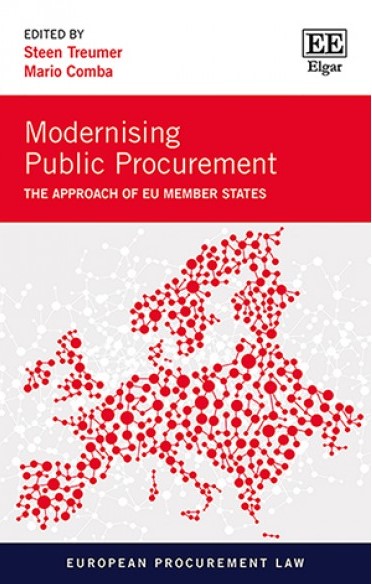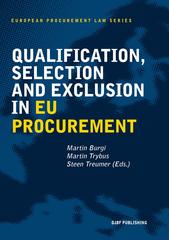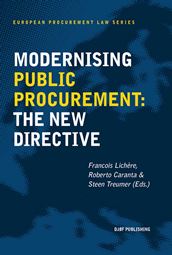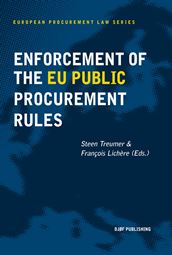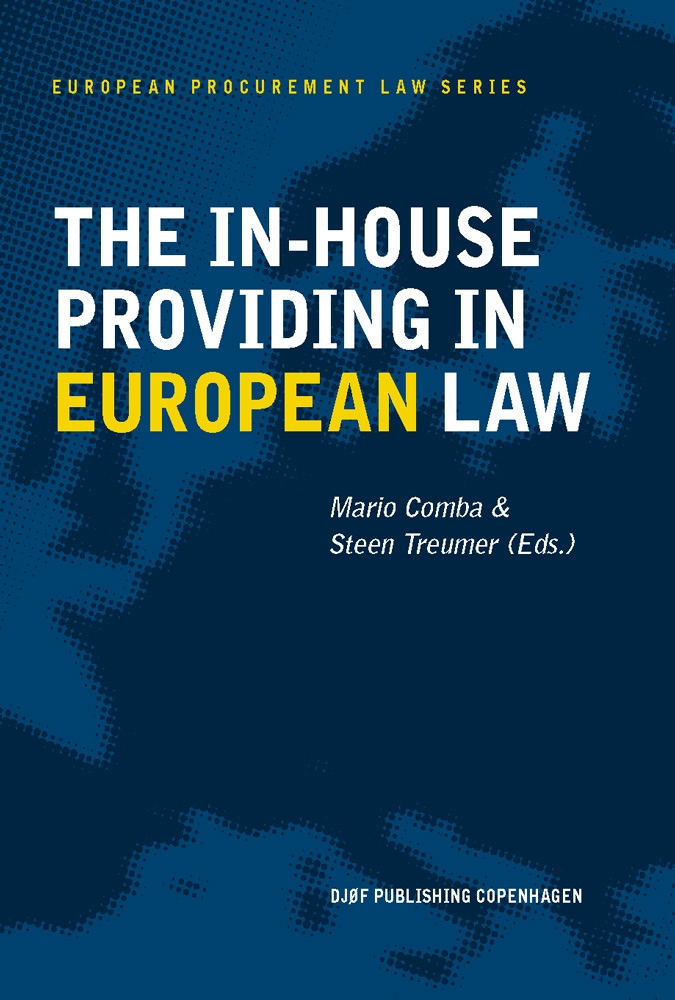Modernising Public Procurement. The Approach of EU Member States
This topical book offers an in-depth analysis of the recent implementation of the Public Procurement Directive, based on the experiences of 12 Member States including France, Germany, Italy, Poland, Spain and the United Kingdom. The contributions from first-class public procurement law experts offer an informed and comparative analysis of the recent implementation of the Public Procurement Directive, as well as focusing on so-called gold-plating (overimplementation) and issues where the legality of the implemented legislation is questionable.
New book! Modernising Public Procurement. The Approach of EU Member States
Modernising Public Procurement. The Approach of EU Member States, a new book with contributions by many EPLG members, is on pre-order now! The book was edited by EPLG Members Steen Treumer and Mario Comba and it was published by Edward Elgar Publishing, in their European Procurement Law series edited by Steen Treumer and Roberto Caranta. It welcomes contributions by R. Ågren, P. Bogdanowicz, M. Burgi, R. Caranta, M. Comba, D. Dragos, P. Ferk, K. Härginen, F. Lichère, B. Neamtu, S. Richetto, A. Sanchez-Graells, M.A. Simovart, A. Sundstrand, S. Treumer, P. Valcárcel Fernández, D. Wolff. The book can be pre-ordered at https://www.e-elgar.com/shop/modernising-public-procurement, with an online 20% discount. Here is a flyer, available for circulation. Here…
EPLG Members Spoke at the Copenhagen University on May 4 and 5 🗓 🗺
On May 4 and 5, 2017, EPLG members Piotr Bogdanowicz, Roberto Caranta, Dacian Dragos, Kirsi-Maria Halonen, Steen Treumer and Martin Trybus spoke at the international conference on Procurement beyond price: Sustainability and CSR in public purchasing, organised by Marta Andrecka at the Copenhagen University. Presentations are available at this link. Here are some pictures from the conference.
Qualification, Selection and Exclusion in EU Procurement
Qualification featured prominently in numerous public procurement disputes in the EU as it is of crucial importance to the outcome of EU tender procedures. This volume supplements the previous volume in the Series on the award phase. The book also considers the implications of the new Public Sector Directive 2014/24/EU with regard to the qualification phase, and provides an analysis of the implementation of the new Directive in a range of Member States. The publication is unique as it is based on a comparative approach covering diversified national approaches to EU public procurement law. Access the full e-book here: Qualification, Selection and Exclusion in EU Procurement.
Competitive Dialogue in EU Procurement
Competitive dialogue is a procedure introduced into the EU procurement system in 2004 to provide an improved method for awarding complex contracts, such as those for public infrastructure and major IT systems. This book provides a critical examination of the legal rules on this new procedure, focusing in particular on grey areas such as availability of the procedure and the scope for negotiations after ‘final tenders’. With contribution by Steen Treumer, Martin Burgi, Pedro Telles, Gabriella Racca http://www.cambridge.org/us/academic/subjects/law/european-law/competitive-dialogue-eu-procurement
Modernising Public Procurement: The New Directive
The recently approved Public Procurement Directive 2014/24/EU has brought a major overhaul to EU law and made significant changes to the obligations of contracting authorities in the Member States. Concurrently, the new directive has introduced some measures of flexibility and important new requirements. This book focuses on the essence of these changes, starting with the definition of a public procurement contract to end with changes to concluded contracts. In between many very important aspects of the reform are analysed, including the new rules on in house and public-public partnerships, on qualification, on the new and more flexible award procedures, including those aimed at fostering innovation. Specific attention is also…
Enforcement of the EU Public Procurement Rules
The European procurement Law Series Vol. 3. The analysis provided in this book focus on the interpretation, implementation and practice in a range of Member States of the EU as enforcement mainly takes place at national level and on the recent changes introduced with Remedies Directive 2007/66. It also considers the correlation between the available remedies, whether the different national systems all are leading to effectiveness, enforcement of the public procurement rules outside of the Public Procurement Directives and includes a general comparative study of the national enforcement regimes.
The In-House Providing in European Law
This book focuses on the distinction between in-house and ex-house providing. The consequence of categorising an arrangement as in-house is that it falls outside the scope of the European public procurement rules. The publication discusses the issue in a broader perspective and looks into the interpretation, implementation and practice in a range of Member States.
Privacy Overview
This website uses cookies to improve your experience while you navigate through the website. Out of these, the cookies that are categorized as necessary are stored on your browser as they are essential for the working of basic functionalities of the website. We also use third-party cookies that help us analyze and understand how you use this website. These cookies will be stored in your browser only with your consent. You also have the option to opt-out of these cookies. But opting out of some of these cookies may affect your browsing experience.
Necessary cookies are absolutely essential for the website to function properly. These cookies ensure basic functionalities and security features of the website, anonymously.
| Cookie | Duration | Description |
|---|---|---|
| cookielawinfo-checkbox-advertisement | 1 year | Set by the GDPR Cookie Consent plugin, this cookie is used to record the user consent for the cookies in the "Advertisement" category . |
| cookielawinfo-checkbox-analytics | 11 months | This cookie is set by GDPR Cookie Consent plugin. The cookie is used to store the user consent for the cookies in the category "Analytics". |
| cookielawinfo-checkbox-functional | 11 months | The cookie is set by GDPR cookie consent to record the user consent for the cookies in the category "Functional". |
| cookielawinfo-checkbox-necessary | 11 months | This cookie is set by GDPR Cookie Consent plugin. The cookies is used to store the user consent for the cookies in the category "Necessary". |
| cookielawinfo-checkbox-others | 11 months | This cookie is set by GDPR Cookie Consent plugin. The cookie is used to store the user consent for the cookies in the category "Other. |
| cookielawinfo-checkbox-performance | 11 months | This cookie is set by GDPR Cookie Consent plugin. The cookie is used to store the user consent for the cookies in the category "Performance". |
| viewed_cookie_policy | 11 months | The cookie is set by the GDPR Cookie Consent plugin and is used to store whether or not user has consented to the use of cookies. It does not store any personal data. |
Functional cookies help to perform certain functionalities like sharing the content of the website on social media platforms, collect feedbacks, and other third-party features.
| Cookie | Duration | Description |
|---|---|---|
| __cf_bm | 30 minutes | This cookie, set by Cloudflare, is used to support Cloudflare Bot Management. |
Performance cookies are used to understand and analyze the key performance indexes of the website which helps in delivering a better user experience for the visitors.
Analytical cookies are used to understand how visitors interact with the website. These cookies help provide information on metrics the number of visitors, bounce rate, traffic source, etc.
Advertisement cookies are used to provide visitors with relevant ads and marketing campaigns. These cookies track visitors across websites and collect information to provide customized ads.
Other uncategorized cookies are those that are being analyzed and have not been classified into a category as yet.

